By Robert St. Martin
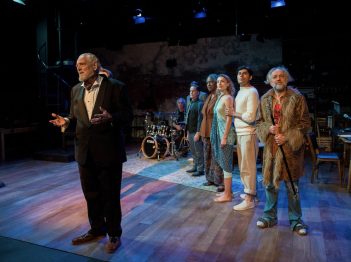 Los Angeles, CA (The Hollywood Times) 7/3/23 – On Saturday July 1, Glendale Antaeus Theatre Company launched its production of Shakespeare’s The Tempest, directed by Nike Doukas in a very musical rendering of the magical island ruled by Prospero, the exiled Duke of Milan and full-time Faustian magician. The audience enters the stage from a side door to see a party going on with John Harvey on drums and John Allee at the piano with JD Cullum on guitar. Original music by John Ballinger and the feeling of a 1940s Radio Drama unfolds, complete with sound effects all performed by the actors on stage. The actors are at once performers as well as their characters on microphones that bring the text clearly to life. This adds to the sense of artifice that dominates this new production of The Tempest, providing an interesting commentary on the nature of stagecraft that Shakespeare would have enjoyed. I do recommend this very energetic, musical, and charming production of The Tempest by the Antaeus Theatre Company at The Kiki & David Gindler Performing Arts Center in Glendale that plays through July 30.
Los Angeles, CA (The Hollywood Times) 7/3/23 – On Saturday July 1, Glendale Antaeus Theatre Company launched its production of Shakespeare’s The Tempest, directed by Nike Doukas in a very musical rendering of the magical island ruled by Prospero, the exiled Duke of Milan and full-time Faustian magician. The audience enters the stage from a side door to see a party going on with John Harvey on drums and John Allee at the piano with JD Cullum on guitar. Original music by John Ballinger and the feeling of a 1940s Radio Drama unfolds, complete with sound effects all performed by the actors on stage. The actors are at once performers as well as their characters on microphones that bring the text clearly to life. This adds to the sense of artifice that dominates this new production of The Tempest, providing an interesting commentary on the nature of stagecraft that Shakespeare would have enjoyed. I do recommend this very energetic, musical, and charming production of The Tempest by the Antaeus Theatre Company at The Kiki & David Gindler Performing Arts Center in Glendale that plays through July 30.
 The Antaeus Theatre Company has a reputation for playing with standard audience expectations about theatricality and certainly Nike Doukas’ rendering of The Tempest has the actors playing directly to the audience more than to each other. We see a row of 1940s microphones in front of the stage, as if the actors were going to do a radio broadcast version of the play. The audience is pulled into the backstage illusion by seeing how all of the cast serve as the special effects department making these noises and sound effects for the storm. Director Nike Doukas cast singers in all the play’s roles. She also filled the stage with noise-makers, with Jeff Gardner designing sound and Foley effects. Gardner taught actors how to create Foley sounds. “I imagined what I wanted, and it’s been really collaborative,” Doukas said. “The actors and I and Jeff have constructed a soundscape that the audience is able to watch being created live.”
The Antaeus Theatre Company has a reputation for playing with standard audience expectations about theatricality and certainly Nike Doukas’ rendering of The Tempest has the actors playing directly to the audience more than to each other. We see a row of 1940s microphones in front of the stage, as if the actors were going to do a radio broadcast version of the play. The audience is pulled into the backstage illusion by seeing how all of the cast serve as the special effects department making these noises and sound effects for the storm. Director Nike Doukas cast singers in all the play’s roles. She also filled the stage with noise-makers, with Jeff Gardner designing sound and Foley effects. Gardner taught actors how to create Foley sounds. “I imagined what I wanted, and it’s been really collaborative,” Doukas said. “The actors and I and Jeff have constructed a soundscape that the audience is able to watch being created live.”
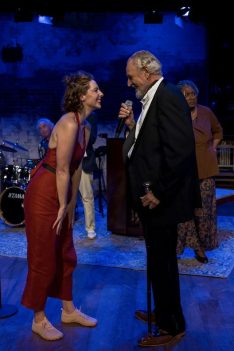 As the play progresses, however, it becomes increasingly involved with the idea of creativity and art, and Prospero’s role begins to mirror more explicitly the role of an author creating a story around him with the “rough magic” of a stage production. With all the actors singing and dancing on stage, their revels are suddenly ended as The Tempest opens with a perfect storm complete with sound effects. The Duke of Milan and the King of Naples and their company as well as the ship’s mariners are lost in the tempest tossed by the waves which Prospero in his magical art has created with the agency of his sprit Ariel.
As the play progresses, however, it becomes increasingly involved with the idea of creativity and art, and Prospero’s role begins to mirror more explicitly the role of an author creating a story around him with the “rough magic” of a stage production. With all the actors singing and dancing on stage, their revels are suddenly ended as The Tempest opens with a perfect storm complete with sound effects. The Duke of Milan and the King of Naples and their company as well as the ship’s mariners are lost in the tempest tossed by the waves which Prospero in his magical art has created with the agency of his sprit Ariel.
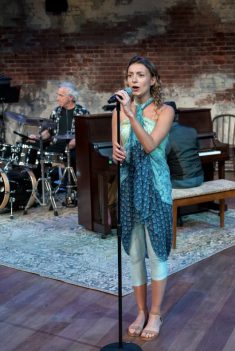 We will eventually learn that Prospero is planning to reclaim his Dukedom of Milan from his usurping brother and restore himself to his rightful place. Hence as he explains to a worried Miranda, he caused the storm to get certain people shipwrecked on his island in order to bring them to justice. Of course, we might wonder why the gifted Prospero was so vulnerable to such theft of his authority in the first place? As he himself explains to Miranda, he was distracted by his love for his books of the “liberal arts” including ones of the sort that Marlowe’s Doctor Faustus once possessed. He reflects, “my library / Was dukedom large enough.” But unlike Marlowe’s play, The Tempest is not a tragedy.
We will eventually learn that Prospero is planning to reclaim his Dukedom of Milan from his usurping brother and restore himself to his rightful place. Hence as he explains to a worried Miranda, he caused the storm to get certain people shipwrecked on his island in order to bring them to justice. Of course, we might wonder why the gifted Prospero was so vulnerable to such theft of his authority in the first place? As he himself explains to Miranda, he was distracted by his love for his books of the “liberal arts” including ones of the sort that Marlowe’s Doctor Faustus once possessed. He reflects, “my library / Was dukedom large enough.” But unlike Marlowe’s play, The Tempest is not a tragedy.
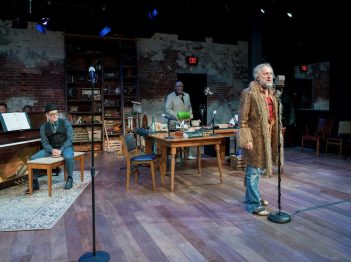 The play will prove a comedy in the end, but here we have a tragic hero, his faults entangled inextricably in his virtues. Art and life stand opposed, as do spiritual and temporal power. The artist is outcast, the philosopher unable to be king. Lost in his studies, sequestered in his study, the magus forfeits his ability actually to exercise the power over life that is the object of his scholarship. The Tempest, then, is a fable about how these divergent ends may be reconciled: how art and nature, the work and the life, and the magician’s wand and the kingly scepter may be wedded and never again put asunder.
The play will prove a comedy in the end, but here we have a tragic hero, his faults entangled inextricably in his virtues. Art and life stand opposed, as do spiritual and temporal power. The artist is outcast, the philosopher unable to be king. Lost in his studies, sequestered in his study, the magus forfeits his ability actually to exercise the power over life that is the object of his scholarship. The Tempest, then, is a fable about how these divergent ends may be reconciled: how art and nature, the work and the life, and the magician’s wand and the kingly scepter may be wedded and never again put asunder.
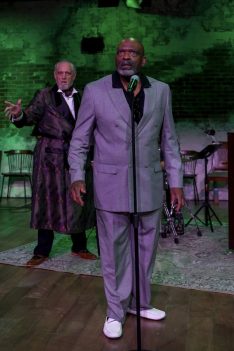 Prospero had been banished twelve years earlier when Prospero’s brother, Antonio (Bernard K. Addison) – also on the doomed ship – conspired with Alonso to become the Duke of Milan instead. Prospero has in fact summoned the storm to drive his enemies into his hands: His brother Antonio (the reigning Duke) and Antonio’s co-conspirator Alonso (King of Naples, played by Adrian LaTourelle), who are sailing back to Italy from the dynastic wedding in Tunisia of Alonso’s daughter. Meanwhile after the storm, on an uninhabited island, we meet the exiled Duke of Milan, Prospero (Peter Van Norden) and his 15-year-old daughter, Miranda (Anja Racic), to whom he explains that he has caused the storm with his magical powers. Prospero and Miranda are served by a spirit named Ariel (Elinor Gunn) and by Caliban (JD Cullum), son of the island’s previous inhabitant, the witch Sycorax.
Prospero had been banished twelve years earlier when Prospero’s brother, Antonio (Bernard K. Addison) – also on the doomed ship – conspired with Alonso to become the Duke of Milan instead. Prospero has in fact summoned the storm to drive his enemies into his hands: His brother Antonio (the reigning Duke) and Antonio’s co-conspirator Alonso (King of Naples, played by Adrian LaTourelle), who are sailing back to Italy from the dynastic wedding in Tunisia of Alonso’s daughter. Meanwhile after the storm, on an uninhabited island, we meet the exiled Duke of Milan, Prospero (Peter Van Norden) and his 15-year-old daughter, Miranda (Anja Racic), to whom he explains that he has caused the storm with his magical powers. Prospero and Miranda are served by a spirit named Ariel (Elinor Gunn) and by Caliban (JD Cullum), son of the island’s previous inhabitant, the witch Sycorax.
 The Tempest begins with a crisis of authority. With the titular tempest, nature pulls rank on kings and counsellors: “What cares these roarers for the name of king?” cries an impertinent boatswain as the ship threatens to run aground in the storm. Yet what seems raw nature – thunder and lightning, wind and wave – is really artifice. We first meet Miranda with her father Prospero in his “cell” or study lined with books. He keeps stressing the importance of obedience as a daughter to her seemingly tyranical but loving father. The complex and distant controlling father is played by veteran actor Peter Van Norden. Miranda (in a wonderful performance by Anja Racic) voices concern and compassion for those she imagines drowned in the tempest near the island and he conjoles her by explaining that his sprit Ariel (Elinor Gunn) saved all those on board the ship and even the ship itself, after leaving some of them on different parts of the island.
The Tempest begins with a crisis of authority. With the titular tempest, nature pulls rank on kings and counsellors: “What cares these roarers for the name of king?” cries an impertinent boatswain as the ship threatens to run aground in the storm. Yet what seems raw nature – thunder and lightning, wind and wave – is really artifice. We first meet Miranda with her father Prospero in his “cell” or study lined with books. He keeps stressing the importance of obedience as a daughter to her seemingly tyranical but loving father. The complex and distant controlling father is played by veteran actor Peter Van Norden. Miranda (in a wonderful performance by Anja Racic) voices concern and compassion for those she imagines drowned in the tempest near the island and he conjoles her by explaining that his sprit Ariel (Elinor Gunn) saved all those on board the ship and even the ship itself, after leaving some of them on different parts of the island.
 Prospero engineers the first meeting of Miranda with Fernand (Peter Mendoza), the son of the King of Naples, who Ferdinand believes perished in the storm. Eventually Miranda will see other humans on her father’s island and famously remarks: “O, wonder! / How many goodly creatures are there here! / How beauteous mankind is! O brave new world / That hath such people in it!” Miranda’s sense of wonderment is quickly cooled by Prospero: “’Tis new to thee.”
Prospero engineers the first meeting of Miranda with Fernand (Peter Mendoza), the son of the King of Naples, who Ferdinand believes perished in the storm. Eventually Miranda will see other humans on her father’s island and famously remarks: “O, wonder! / How many goodly creatures are there here! / How beauteous mankind is! O brave new world / That hath such people in it!” Miranda’s sense of wonderment is quickly cooled by Prospero: “’Tis new to thee.”
 Prospero seems to disappear from the action of the play in Act II, as the sprit Ariel proceeds to do the magical work in expectation of promised freedom by Prospero. We meet the other characters in the play, including Caliban (who is played by JD Cullum, when he is not playing guitar accompaniment to many of the 10 original songs in the productions – many sung by Ariel). Unlike the ethereal Ariel, the earthy Caliban does the island’s dirty work, its manual labor, tortured all the while by Prospero’s magical reign of surveillance and punishment. He complains to Prospero: “You taught me language; and my profit on’t / Is, I know how to curse.”
Prospero seems to disappear from the action of the play in Act II, as the sprit Ariel proceeds to do the magical work in expectation of promised freedom by Prospero. We meet the other characters in the play, including Caliban (who is played by JD Cullum, when he is not playing guitar accompaniment to many of the 10 original songs in the productions – many sung by Ariel). Unlike the ethereal Ariel, the earthy Caliban does the island’s dirty work, its manual labor, tortured all the while by Prospero’s magical reign of surveillance and punishment. He complains to Prospero: “You taught me language; and my profit on’t / Is, I know how to curse.”

Meanwhile, in another part of the island, Alonso (Adrian LaTourelle), Antonio (Bernard K. Addison), Alonso’s brother Sebastian (John Allee), and Alonso’s aged counsellor Gonzalo/Gonzala (played here by Sandra McClain), wander disconsolately, lost, imagining Ferdinand dead. Having already defrauded Prospero of a dukedom, Antonio now conspires with Sebastian to murderously relieve Alonso of his crown. Usurpations upon usurpations. In ironic counterpoint to this treachery, the Polonius-like prattler Gonzala conjures up an utopian vision of the golden age inspired by the island’s apparent natural fecundity.
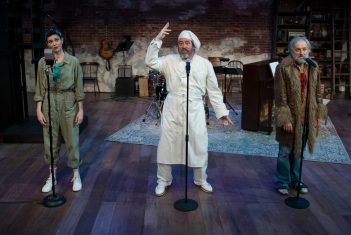
The play persistently analogizes magic to art, with Prospero often speaking at the side of the stage like a director or writer, commenting on the performance and the performers. Through the agency of Ariel, he uses magic to enchant and control, blessing Ferdinand and Miranda’s betrothal with a masque of Ceres and Juno, enticing Alonso and company with false fairy food, and, in the most famous and beautiful song in Shakespeare, beguiling Ferdinand to imagine his father transfigured in death.
Later, Caliban joins forces with two clownish, drunken, lowborn members of Alonso’s shipwrecked retinue, Francisco (John Harvey) and Trinculo/Trincula (Erin Pineda). Believing themselves to be the ship’s lone survivors, they plot to kill Prospero and rule over the island themselves. One of these clods, upon first seeing Caliban, sottishly muses, that Caliban is a “monster, half-fish.” The comedic subplot is endlessly entertaining stuff for the audience.
Generations believe that they hear Shakespeare’s own resigned farewell to his artistry in Prospero’s final speeches, after the staging of the masque of Ceres & Juno in the final act:
Our revels now are ended. These our actors,
As I foretold you, were all spirits and
Are melted into air, into thin air:
And, like the baseless fabric of this vision,
. . . Ye all which it inherit, shall dissolve
And, like this insubstantial pageant faded,
Leave not a rack behind. We are such stuff
As dreams are made on, and our little life
Is rounded with a sleep.
But insofar as the speech acknowledges the artifice of the performance, the limit of this artifice, Nike Doukas’ production of The Tempest at the Antaeus Theatre captures the essence of this artifice and the limits of the stage. This is a play about forgiveness: Prospero forgives and he congratulates himself for following the dictate of his “nobler reason” in doing so. Miranda and Ferdinand provide Prospero with a path to forgiveness. In that, Prospero renounces his magic:
But this rough magic
I here abjure, and, when I have required
Some heavenly music, which even now I do,
To work mine end upon their senses that
This airy charm is for, I’ll break my staff,
Bury it certain fathoms in the earth,
And deeper than did ever plummet sound
I’ll drown my book.
Although academic critics might not concur, Director Nike Doukas suggests: “You hear the language, and this is a personal play. I believe that Shakespeare was really writing about his own demise, the end of his career.” Magic has its limits as does theater. In the epilogue, Prospero pleads to the audience, “But release me from my bands / With the help of your good hands,” as if art were a solipsistic prison without a reciprocation from the audience. The audience rose for a standing ovation of a fine performance by an excellent troupe of actors through the magic of theatre.
Performances take place July 1 through July 30, with performances on Fridays at 8 p.m.; Saturdays at 2 p.m. and 8 p.m.; Sundays at 2 p.m.; and Mondays at 8 p.m. (no matinees on July 1, July 29; dark Monday, July 3). The Kiki & David Gindler Performing Arts Center is located at 110 East Broadway, Glendale, CA 91205 (between N. Brand Blvd. and Artsakh Ave.). For reservations and information, call 818-506-1983 or go to www.antaeus.org.